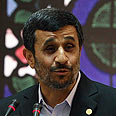
Iran offers to support Lebanese army
Islamic Republic offers aid after US suspends military funding to Lebanon over fatal border incident with Israel
Iran has offered support to Lebanon's army, a week after a deadly cross-border clash between Lebanon and Israel which prompted US lawmakers to block funding to the Lebanese military.
The offer from Iran, which supports Lebanon's militant Shiite group Hezbollah, could fuel Western concern that Tehran is increasing its influence near Israel's northern border.
Israel said it had complained to Washington and Paris about funds to the Lebanese army after a skirmish left two Lebanese soldiers, a Lebanese journalist and a senior Israeli officer dead in the worst border violence since 2006 war between.
Iran's ambassador to Lebanon met Lebanese army chief Jean Kahwaji on Monday and said Tehran was ready to "cooperate with the Lebanese army in any area that would help the military in performing its national role in defending Lebanon".
Iranian President Mahmoud Ahmadinejad is expected to visit Beirut next month.
Preserving army neutrality
Two US Democrat lawmakers said they were holding up $100 million (about NIS 375 million) that was approved for Lebanon's army but not yet spent. A senior House Republican, Eric Cantor, said future funding should be stopped too, pending an inquiry into the clash.
Cantor said the lines between Hezbollah, the Lebanese military and the government had become "blurred".
But US State Department spokesman P.J. Crowley said US President Barack Obama was not planning to re-evaluate its military cooperation with Lebanon.
"It allows the government of Lebanon to expand its sovereignty. We think that is in the interest of both of our countries and regional stability as a whole," he said on Monday.
The Lebanese army is seen as woefully under-equipped compared to Hezbollah, which is believed to have been rearming since the 2006 war with Israel. The military lost 170 troops when battling an al Qaeda-inspired Islamist group holed up in a Palestinian refugee camp in 2007.
The United States has provided more than $720 million (about NIS 2.7 billion) in assistance to the Lebanese army since 2006.
Defense Minister Ehud Barak said it was a mistake to arm Lebanon's military with advanced weapons because they were being used by the army against the Jewish state.
Crowley said he was not aware that any US equipment was used during the incident.
The fact that Lebanon's national unity government includes politicians allied to the United States, France and Saudi Arabia as well ministers from Hezbollah, supported by Iran and Syria means, theoretically at least, the army could get support from both sides.
Support from both sides
Beirut-based analyst Rami Khouri said it remained to be seen whether the military, which has sought to maintain neutrality from Lebanon's factional politics, could absorb support from both sides.
"My guess is that everybody will be careful that the army won't be politicized. If that is the case it could become a tool of political control and therefore sectarian battles and it could fall apart," he told Reuters.
Lebanese President Michel Suleiman announced on Saturday a plan to build up the armed forces "regardless of the position of some countries", in apparent reference to Israel's complaints.
A statement from Suleiman's office said he had received numerous phone calls "from Lebanon and Lebanon's friends who expressed the desire to contribute to arming the military."
Israel said a Lebanese army sniper opened fire last week on two IDF officers as they watched a tree-pruning operation on the Israeli side of a security fence below the UN "Blue Line".
The Lebanese army said it first fired warning shots, and then Israelis fired at their soldiers. IDF artillery and tank fire followed.
Hezbollah did not take part in last week's clash, although the organization's Secretary-General Hassan Nasrallah has said his powerful Shiite guerrillas would intervene if Israel attacked the army again.
Khouri said Lebanon's leaders would be careful to "safeguard the neutrality and the integrity of the army."
"But at the same time they need equipment," he said. "The Lebanese are willing to get arms from different sources, as long as you make it clear to everybody that they're not buying their loyalty."
- Follow Ynetnews on Facebook










